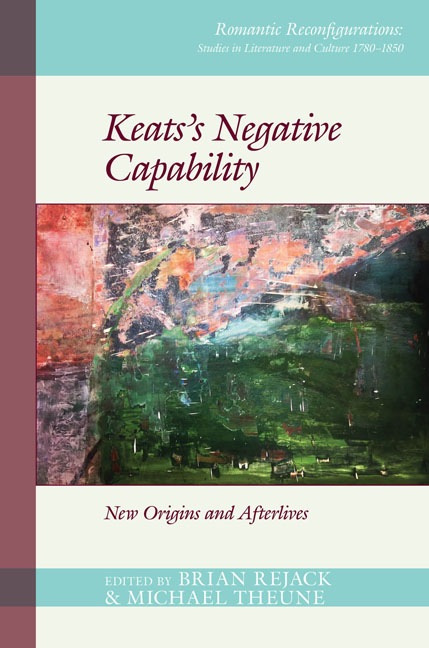Book contents
- Frontmatter
- Contents
- List of Figures
- Acknowledgments
- List of Abbreviations
- List of Contributors
- Preface
- Introduction: Disquisitions: Reading Negative Capability, 1817–2017
- Part I ‘swelling into reality’: New Contexts for Negative Capability
- Part II ‘examplified throughout’: Forms of Negatively Capable Reading
- Part III ‘pursued through Volumes’, Volume I: Negative Capability in Twentieth- and Twenty-First-Century American Poetry
- Part IV ‘pursued through Volumes’, Volume II: Adaptations, Appropriations, Mutations
- Afterword: Reading Keats's Negative Capability
- Bibliography
- Index
10 - Versions of Negative Capability in Modern American Poetry and Criticism
- Frontmatter
- Contents
- List of Figures
- Acknowledgments
- List of Abbreviations
- List of Contributors
- Preface
- Introduction: Disquisitions: Reading Negative Capability, 1817–2017
- Part I ‘swelling into reality’: New Contexts for Negative Capability
- Part II ‘examplified throughout’: Forms of Negatively Capable Reading
- Part III ‘pursued through Volumes’, Volume I: Negative Capability in Twentieth- and Twenty-First-Century American Poetry
- Part IV ‘pursued through Volumes’, Volume II: Adaptations, Appropriations, Mutations
- Afterword: Reading Keats's Negative Capability
- Bibliography
- Index
Summary
As Michael Theune observes, the phrase negative capability has been used so often, in so many disparate contexts, that it often feels like an empty cliché. Yet the fact the phrase so commonly appears as mere platitude does not mean it must always work that way: at other times, the concept can be deployed with quite specific local meanings, in differential tension with its significance in other contexts. In other words, while writers at times go to ‘negative capability’ for a hit of feel-good fuzziness, the phrase elsewhere emerges as the ground of more sharply marked contestation. As the concept travels along multiple itineraries through modern and recent poetry and criticism, it moves in tandem with particular versions of Keats, in connection with particular histories of Keats-reception, and in relation to specific discursive, disciplinary, and institutional configurations. Though in the space I have here I cannot hope to map these itineraries in any kind of comprehensive way, I aim in what follows to locate a few orientation points within this terrain through a comparative look at three individually rich takes on negative capability.
I begin by briefly reviewing important mid-twentieth-century formulations of negative capability by two towering figures operating in what would seem opposite institutional circumstances: the Harvard scholar Walter Jackson Bate and the poet and Black Mountain College figure Charles Olson. While Bate’s writing on negative capability has been widely influential, Olson is also a key origin point for the concept's currency within experimental poetics specifically. Despite the vast difference in the terms through which these writers understand negative capability, however, there are also surprising similarities in the aims with which each mobilizes the concept within the scene of pedagogy and within the postwar intellectual scene more generally. Adrienne Rich’s complex negotiation with Keats in her 1986 elegy ‘In Memoriam: D.K.’ comes at negative capability from a quite different angle. Engaging a queer (and queering) tradition of Keats-reception, the poem tests and critiques the ideas Bate and Olson both advance of negative capability as ‘virtue’.
Walter Jackson Bate
Any time after the mid-1960s, when people say negative capability they often— but not always—mean something like ‘Walter Jackson Bate's negative capability’.
- Type
- Chapter
- Information
- Keats's Negative CapabilityNew Origins and Afterlives, pp. 154 - 170Publisher: Liverpool University PressPrint publication year: 2019



